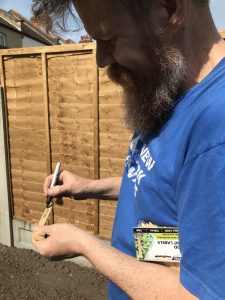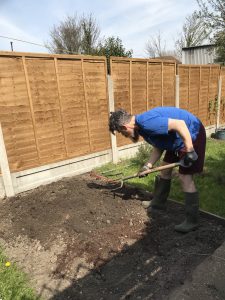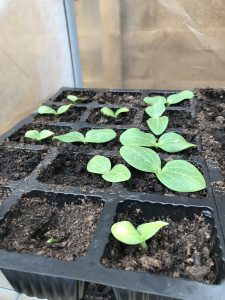Over the Easter weekend I was getting my hands dirty digging the veg patch and planting seeds. The weather has been so clement that my courgettes are shooting up already! In this week’s blog I explore our relationship with the earth and food we grow in it. Acupuncture isn’t just about needles, a few simple lifestyle changes (such as how we eat) can make a big difference.
Connecting with the Earth


It’s really important that we connect with nature; in fact it’s vital to our health. Spending time in nature is becoming a big thing in health care all around the world. In Japan they call it shinrin-yoku, or forest bathing. Nature therapy, as it is called elsewhere, helps to free us from the distractions from the modern world. Not a particularly new idea I guess, but whatever way the holistic health ideal gets out there is great. In other parts of the world it is called garden therapy, horticultural therapy, Kneipp therapy or even ocean therapy. Whatever you call it, connecting with nature has to be good for us.

Becoming grounded
The concept of Earth and grounding is fundamental to Chinese Medicine. It is central to everything. It is a pivotal time of year between the Yang and Yin when the summer is waning, around September, when fruits are at their ripest and sweetest. Earth is also important in Qi Gong as Man is the connection between Heaven and Earth. We need to be grounded, not only metaphorically but literally. Gravity helps of course, but we all know people who have their heads in the clouds and are ungrounded, flitting from one thing to the next. It’s important to have the creativity and freedom that comes with an attachment with the heavens, but it’s equally important to have our feet firmly planted on the ground.

In Wing Chun emphasis is put on the development of the horse stance, a stance used to ground oneself to generate power and stability. It’s about being as solid and immoveable as a mountain, but not totally rigid and inanimate. Mountains move, the whole Earth does in fact, we are just unaware of it! By becoming connected to the Earth one is not only able to absorb power from it, but also transfer force into it, just like the roots of a tree.
The importance of proper digestion
We can also ground ourselves with food, by touching it, smelling it and tasting it. Take a moment to really connect with what is in your mouth when you are eating. Chew your food really well. I am really adverse to food being liquidized before eating it, as I believe chewing is important to the digestive process. Digestion starts in the mouth. The action of chewing stimulates the release of saliva which contains digestive enzymes that break down starches into simple sugars. Saliva also contains some fat digesting enzymes that begin the process of breaking down fats in our food. Not only chewing, but smell and taste receptors also trigger the production of stomach acid and pancreatic juices
In Chinese Medicine the whole digestive system is compared to a machine that mulches and heats the food to obtain the essences which are then converted into Qi and Blood. By chewing we are breaking down the food into more manageable pieces but also heating it up. If this doesn’t occur then vital energy is wasted in doing the heating which can result in Spleen deficiency and its related problems. Without adequate chewing you will feel heavy and dull, develop gas, and be undernourished.
The art of chewing
Chewing ones food is again nothing new, but it became a big thing in the 19th century when nutritionist Horace Fletcher (1849-1919) developed into a real art. He believed that you can eat whatever you like, but you must only eat when you are hungry and every mouthful should be chewed until it had lost its flavour. Fletcher himself used to ‘Fletcherize’ each mouthful of food up to 100 times! He famously said “Nature will castigate those who do not masticate”!
His message to humanity – to have an excellent overall health – was to have a holistic approach involving three steps:
- Eat only when you have a good appetite
- Chew the food like pulp and drink that pulp. Do not swallow food.
- Drink all the liquids and liquid food sip by sip. Do not drink in gulps.
It sounds horrible!
Eating the Chinese way
In Chinese Medicine the way we eat is important too, but unlike Fletcherism there has to an element of joy to it. Who wants to be like a cow chewing the cud all day? However, there are still plenty of do’s and don’ts when eating. These are just a few:
- If you want something badly enough it’s probably more healthy just to eat it. The mental anguish in suppressing the desire will probably do you more harm.
- Eat in a nice environment.
- Avoid arguing or emotionally charged conversations.
- Don’t be too hot or too cold.
- Turn the tv off.
- Don’t read.
- Don’t eat before a bath (or in the bath!).
- Take time to self-reflect – eating is a time to nurture not only the body but the mind also.
- Relax after food, but don’t rush off to bed.
- Give thanks before and after eating.
- Try to eat locally, organically, and seasonally.
So I hope this week’s blog has given you food for thought. Remember, we are of the materials of the Earth so it’s important to respect what it offers. Be compassionate towards animals and plants and only consume what is needed. We should feel the same aversion to polluting our bodies as we do the environment.
If you have any questions about acupuncture, or any of the topics in my blogs, please do contact me. Find out more about me, or my treatments here.

